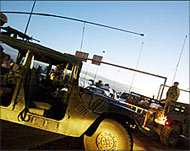Daily dangers on streets of Iraq
The first thing we heard was a short burst of machine-gun fire, followed by the screeching of tyres and several loud thumps.

The incident occurred not more than 40m from the house where I was staying in Baghdad‘s western suburbs. By the time we grabbed the cameras and rushed to the scene, American soldiers were already deployed around the wreckage of a battered orange and white Toyota pick-up truck.
The windshield was riddled with bullet holes and it was evident that the Toyota had careened off the highway, then ploughed through a chain-link fence before being brought to a stop by a metal lamppost. Steam was still billowing out of the shattered radiator and the driver’s bloodied arm hung lifelessly through the open door.
As we approached the crash site, one of the American soldiers spotted my camera and immediately aimed his rifle at me. “Get that camera the hell out of here, or I’ll shoot your sorry ass too,” he screamed.
I quickly raised the camera over my head to indicate complete compliance, and backed away around the corner. It was obvious that the adrenaline and fear of the American soldiers was at such a high level, that it would be unwise to try to initiate any further discussion.
Safe distance
Only after an ambulance had removed the body and the US detachment had departed did we consider it safe enough to return. About two dozen Iraqi civilian police were swarming all over the scene, collecting evidence and taking photographs. Unlike the American soldiers, the Iraqis were cordial and willing to talk.
“The Americans said that the victim aimed a gun at them as their convoy passed his pick-up truck on the highway,” said one policeman, “so it is clearly a matter of self-defence.” Tania, a 64-year-old widow living in the house next to the highway, had been in her garden at the time and provided a slightly different eyewitness account.
“The driver had been yelling out his window and shaking his fist at the Americans – when suddenly they shot him,” she said. “How could he have had a gun?”
As the US casualty count continues to climb, the occupation troops in Iraq have become increasingly jumpy and less willing to put themselves at risk. Showing me the petrol station close to his home, Anmar Al-Saadi, a former Iraqi soldier, explained how the US Army used to position a tank on the corner to provide security.
“One day last month, an Iraqi resistance sniper shot the tank commander right in the head,” Anmar said.
Frightened Americans
“The Americans shot up the entire apartment building, but they didn’t get the sniper. Now they are too afraid to send the tank back here.”
The soldiers’ rattled nerves and frustration at not being able to contain the guerrillas has resulted in American troops becoming increasingly aggressive in their dealings with the local population.
Nazar, a 38-year-old former employee of the Iraqi foreign ministry and who once served a diplomatic posting in Ottawa, recounted one such incident.
 |
|
US soldiers make their way |
Caught in a typical Baghdad traffic jam, a US soldier had simply used his Hummer’s superior weight to push aside Nazar’s little Opel. Enraged that the collision had crushed his headlight, Nazar had jumped out of his car to voice a protest.
“Instead of an apology, the soldiers proceeded to shoot out my tyres and windshield,” said Nazar. “They laughed and yelled ‘Now you can forget about your headlight.'”
Car fire
American troops are not always so brazen. In another incident we happened to witness, an old taxi was passing by our restaurant when it suddenly burst into flames.
The terrified driver braked to a halt and rushed away from his vehicle. At that moment, a US patrol of three Hummers happened to be passing by. They hastily reversed to a safe distance, fearing that this was a car-bomb intended for them.
Although the shaken Iraqi driver and a number of bystanders stood only metres away from the blaze, the Americans stayed well back.
For the next 20 minutes, my interpreter and I acted as the go-between in order to provide both the driver and the US troops with mutual assurance. The American lieutenant could not be convinced that the car would not explode, but he did guarantee the Iraqi driver that he would not be arrested for carrying black-market fuel.
Another problem plaguing those who venture on to Iraqi highways is the undefined powers and jurisdiction that exist between the US forces and the newly-constituted Iraqi police force.
On the highway south of Kirkuk, Iraqi police had seized a Nissan Pathfinder driven by Jahal Turkan, a 22-year-old pharmacist. “They claim that my registration is a forgery, and took my vehicle without any proof,” said Turkan. “But I know they will resell this car before I can return with the paperwork.”
Left stranded at the checkpoint with his wife and two small children, Turkan had protested his case to a nearby US patrol. “The soldier laughed at me and said ‘Hey, that is what you call freedom,'” said Turkan. “Is it freedom when you give uniforms and guns to thieves?”